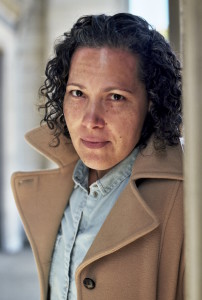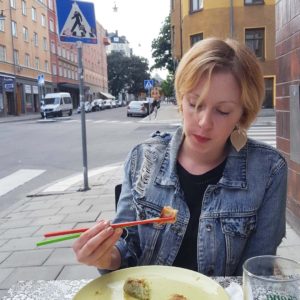
Fred Marchant’s fifth book of poetry, Said Not Said, is forthcoming in May 2017 from Graywolf Press. The poems in this book hover at the horizon of language, that place where what is said can only point beyond to that which is crucial yet one barely has any words for.
“The Unacceptable,” one of the first poems Said Not Said is also in this issue of The Ocean State Review. It’s a poem that, like Fred himself, has its roots in Rhode Island. He grew up in Providence, went to school there, and in later years, returned often to see his aging parents and others in his family, including his older sister, whose schizophrenia and hospitalization is the subject of “The Unacceptable.” This poem is a meditation not only on her pain and bewilderment, but also on her strength, wit, determination, and heart. Fred has lived in the Boston area for many years now, has recently become an Emeritus Professor of English at Suffolk University, where he founded the creative writing program and poetry center. HIs first book, Tipping Point, won the 1993 Washington Prize from The Word Works, and was recently re-issued in a 20th anniversary second edition, with an introduction by Nick Flynn. His other books include Full Moon Boat and The Looking House, both from Graywolf Press. He has also had a new and selected edition published in Dublin by Dedalus Press. Along with his co-translator Nguyen Ba Chung, Fred Marchant has also translated the work of contemporary Vietnamese poets such as Tran Dang Khoa and Vo Que. A longtime teaching affiliate of the William Joiner Institute for the Study of War and Social Consequences at UMass Boston, Fred has taught poetry workshops in various venues across the country.
Her
last day on the planet she thrashed and spit while the nurses tied
her wrists to the bedrail, strips of cloth that worsened what was
happening.
Her face grew radiant, her whole being flush from the long
struggle with those she knew she should never have trusted.
They tried to keep track of her vitals, chart her erratic heart, and
peer into her cranium with a flashlight through the eyes.
They taped death-lines to a port in her arm, and said she should
believe in the plastic tube at her nose, that it would fill her lungs
with good clean air.
She shook her head as hard as she could, got her whole body to
say no, thou shalt not, nope, no way, thou shalt not touch me,
nothing doing.
Not with the elbow-bendable straw adjusted to her lips, not with
the insidious needle pointed upward and dribbling over.
And absolutely not with the noisy metal thing the attendant
in scrubs wheeled in, not that wheezing apparatus of the
unacceptable.
Rachel M. Harper is a novelist and screenwriter based in Los Angeles. Her first novel, Brass Ankle Blues, was a Borders Original Voices Award finalist and selected as a Target Breakout Book. Her new novel, This Side of Providence, was published in 2016, and has been heralded by luminaries such as Alice Walker, Sena Jeter Naslund, and Jacqueline Woodson. She has received fellowships from Yaddo, the MacDowell Colony, and the R.I. State Council on the Arts. A graduate of Brown University and the University of Southern California, Harper is on the faculty at Spalding University’s low-residency MFA in Writing Program. Her website is http://rachelmharper.com/
“Miss Valentín” is an excerpt from my novel, This Side of Providence, and it follows one of the satellite characters in the book, Miss Valentín, a dedicated and much-loved teacher who reveals herself to be more vulnerable and complicated than she first appears. In many ways, she is the moral conscience of the book, but I wanted her to exist as more than simply the authority figure behind the desk, to embody more than just her label of “model minority,” the one who pulls herself up by her bootstraps; I wanted her to be a full, flesh-and-blood character, so that’s why this story is so important. She reveals not just secrets from her past in this section, but insights into her character’s struggle with shame and longing, things that show her to be quite similar to the rest of the characters—to be flawed and heartbreakingly human—even while illuminating her distinct and singular path, the one she will forge relentlessly throughout the book, ultimately leading to redemption and hope for them all.
from “Miss Valentín”
I stood out for a lot of reasons growing up. I played
chess instead of playing with dolls. I never learned how to sew
or cook, but I knew the rules of baseball by the time I could
read. Other girls sang in church and jumped rope in teams
of two or three, while I played the violin and walked to the
corner store all by myself. Food was my constant companion
(my first friend, my oldest friend) and the only thing that has
never let me down. By the 5th grade I could read equally well
in English and Spanish, something even my parents struggled
with, and I was on the honor roll for all of junior high. When
I was thirteen my homeroom teacher encouraged me to apply
to the same college prep high school she’d gone to, so I rode
the subway from Brooklyn into Manhattan (by myself) and
took the entrance exam without even telling my parents. At
first they didn’t want me to go, but when I told them that two
presidents had gone there they rushed out and bought me the
school uniform. New, not used.
I was comfortable being an outsider, both in my
neighborhood and in my own home, but suddenly I wasn’t so
different from the other Puerto Rican girls I’d grown up with.
Sixteen, pregnant, and unmarried; I finally fit in.
Beth Ayer is a writer and editor living in Easthampton, MA. Her poetry has been published in journals including jubilat, Otis Nebula, Apartment, Epigraph, and Divine Magnet.
Nothing Party
let’s have a game and stare
at our hands. until we lose
the hand we do not hold,
we’ll evanesce. leave everything
we take under the porch
and turn off the lights. turn off
the streetlight: an umbrella
raining under an umbrella, an inverted obelisk
observing the feathered edges of the dark.
universes we didn’t
leave in the rack in the bathroom
at all, for you. we put nothing for you
in the mirror. we put nothing in the bath.
we erased the bath and laid a towel
under your breath.
remember what you did
yesterday? and this morning?
we don’t.
no need to stand
on your back legs—there is not even
a throw rug with concentric circles.
you want to stay?
unmake us a thing that exists: a tree,
an elephant, a golden spiral.
see The Collector shaking seed
across the road in a kimono.
bring her to us.


